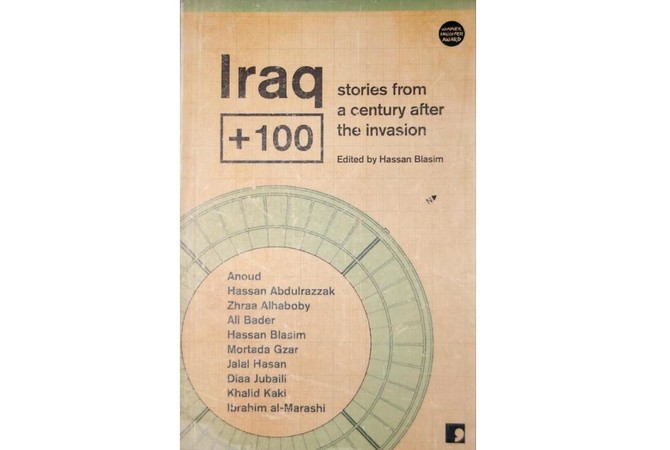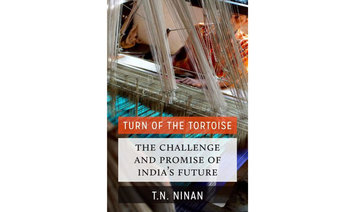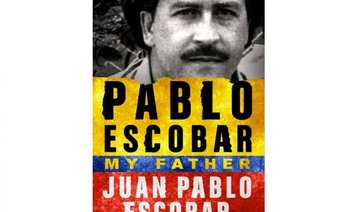“Iraq + 100: Stories from a century after the invasion” is a collection of short science fiction stories by 10 Iraqi authors. The authors, some of whom live in Iraq and some of whom live abroad, imagine what the country will be like in the year 2103.
Edited by Hassan Blasim and originally suggested by Blasim’s publisher, Ra Page, the idea first came up in 2003 as a way to deal with the US invasion of Iraq. Considering science fiction stories are not common in the Arab world, Blasim wrote to many authors to convince them to write a futuristic story based on his belief that “writing about the future would give them the space to breathe outside the narrow confines of today’s reality.”
Blasim received a multitude of stories, in both Arabic and English, which he compiled to create this book.
Many stories stem from oppression, religious fanaticism and capitalist nightmares. Most of the tales are heartbreaking in their own way, as they lay bare the injustice that has riddled Iraq. One such story is titled “Kahramana” by an author called Anoud. The story is set in Sulaymaniyah and centers on Kahramana, who has been coerced into a forced marriage but flees to an international court in the hope that she will be allowed asylum elsewhere. Crowds rally behind her, but as her case takes years, and goes through its own ups and downs, the crowds begin to dwindle and the attention she once received disappears. The story exposes the futility of support and highlights the notion that crowds will rally until time and patience run out, leaving the victims to be forgotten.
This experience is not limited to one country, it is a worldwide tragedy and sadly repeats itself when humans become desensitized to the loss of life.
Creativity and imagination play an important role in the collection as authors such as Blasim, Hassan Abdulrazzak, Mortada Gzar and Khalid Kaki delve into advanced technological visions of Iraq. In “The Gardens of Babylon,” written by Blasim and translated by Johnathon Wright, Babylon is a playground for “virus architects and software artists.” Water is scarce but the Chinese have established a system to counter environmental shortcomings. In Kaki’s story, “Operation Daniel,” translated by Adam Talib, the past is frowned upon and ancient languages and literature are prohibited. Powerful overlords such as Gao Dong, who renames Kirkuk “Gao’s Flame,” believe that citizens are their beneficiaries and must “protect the state’s present from the threat of the past.” In Abdulrazzak’s story, “Kuszib,” life has changed entirely and no semblance of the old world exists.
The authors in this book do not shy away from bleak visions of the future, visions that have arisen from the destructive political and environmental policies of current-day Iraq. Climate change, depleting natural resources and rampant poverty cause the characters to yearn for a time before political struggle tainted the lives of Iraq’s inhabitants. “The Corporal,” written by Ali Bader and translated by Elisabeth Jaquette, is one such story. A fallen Iraqi soldier comes back to the world to tell future Iraqis who he was. He tells whoever will listen that he was born in 1960, served in the Iraqi army for 22 years, faced war for most of his time on earth and died for reasons misunderstood. It highlights the limited opportunities people ravaged by war have when it comes to choosing their own destiny.
Diaa Jubaili, Zhraa Al-Haboby, Jalal Hassan and Ibrahim Al-Marashi focus on futures in which citizens speak of the past and refuse to forget it. There is a particular longing for peace and tranquility in their stories, especially in “The Here and Now Prison,” written by Hassan and translated by Max Weiss. This theme is also prevalent in “Baghdad Syndrome,” written by Al-Haboby and translated by Emre Bennett, in which the older characters still refer to streets by their old names, still dream of Baghdad and revel in a beautiful past.
Each author touches upon Iraq’s tragic history and its bleak future. The destruction of the environment plays as important a role as the destruction of the country. Powerful overlords, authoritarian regimes and the continued limitation of life and freedom are presented in nearly every story, revealing powerful insight into the visions these creative talents have of Iraq’s future. However, a longing for the past keeps hope alive in the stories and allows the reader to revel in a past unknown to them, one that is not forgotten and one that will be carried through time, despite war and invasion. The memories of human life and history cannot be taken away as long as they are written about and remembered and this compilation is a testament to the hope that resides in remembrance, creativity and imagination.
Book Review: A testament to creativity and imagination
Book Review: A testament to creativity and imagination

What We Are Reading Today: ‘The Organic Line’

- Once recognized, however, the line has seismic repercussions for rethinking foundational concepts such as mark, limit, surface, and edge
Author: IRENE SMALL
What would it mean to treat an interval of space as a line, thus drawing an empty void into a constellation of art and meaning-laden things? In this book, Irene Small elucidates the signal discovery of the Brazilian artist Lygia Clark in 1954: a fissure of space between material elements that Clark called “the organic line.”
For much of the history of art, Clark’s discovery, much like the organic line, has escaped legibility. Once recognized, however, the line has seismic repercussions for rethinking foundational concepts such as mark, limit, surface, and edge.
What We Are Reading Today: Citizen Marx by Bruno Leipold

In Citizen Marx, Bruno Leipold argues that, contrary to certain interpretive commonplaces, Karl Marx’s thinking was deeply informed by republicanism.
Marx’s relation to republicanism changed over the course of his life, but its complex influence on his thought cannot be reduced to wholesale adoption or rejection. Challenging common depictions of Marx that downplay or ignore his commitment to politics, democracy, and freedom, Leipold shows that Marx viewed democratic political institutions as crucial to overcoming the social unfreedom and domination of capitalism.
One of Marx’s principal political values, Leipold contends, was a republican conception of freedom, according to which one is unfree when subjected to arbitrary power.
Placing Marx’s republican communism in its historical context—but not consigning him to that context—Leipold traces Marx’s shifting relationship to republicanism across three broad periods. One of Marx’s great contributions, Leipold suggests, was to place politics (and especially democratic politics) at the heart of socialism.
What We Are Reading Today: ‘Elusive Cures’ by Nicole Rust

Brain research has been accelerating rapidly in recent decades, but the translation of our many discoveries into treatments and cures for brain disorders has not happened as many expected.
We do not have cures for the vast majority of brain illnesses, from Alzheimer’s to depression, and many medications we do have to treat the brain are derived from drugs produced in the 1950s—before we knew much about the brain at all.
Tackling brain disorders is clearly one of the biggest challenges facing humanity today. What will it take to overcome it? Nicole Rust takes readers along on her personal journey to answer this question.
What We Are Reading Today: ‘The Atlas of Birds’ by Mike Unwin

“The Atlas of Birds” captures the breathtaking diversity of birds, and illuminates their conservation status around the world.
Full-color maps show where birds are found, both by country and terrain, and reveal how an astounding variety of behavioral adaptations—from flight and feeding to nest building and song—have enabled them to thrive in virtually every habitat on Earth.
Maps of individual journeys and global flyways chart the amazing phenomenon of bird migration, while bird classification is explained using maps for each order and many key families.
What We Are Reading Today: ‘When the Bombs Stopped’

- Fifty years after the last sortie, residents of rural Cambodia are still coping with the unexploded ordnance that covers their land
Author: ERIN LIN
Over the course of the Vietnam War, the United States dropped 500,000 tonnes of bombs over Cambodia—more than the combined weight of every man, woman, and child in the country.
What began as a secret CIA infiltration of Laos eventually expanded into Cambodia and escalated into a nine-year war over the Ho Chi Minh trail fought primarily with bombs.
Fifty years after the last sortie, residents of rural Cambodia are still coping with the unexploded ordnance that covers their land. In “When the Bombs Stopped,” Erin Lin investigates the consequences of the US bombing campaign across post conflict Cambodia.



















